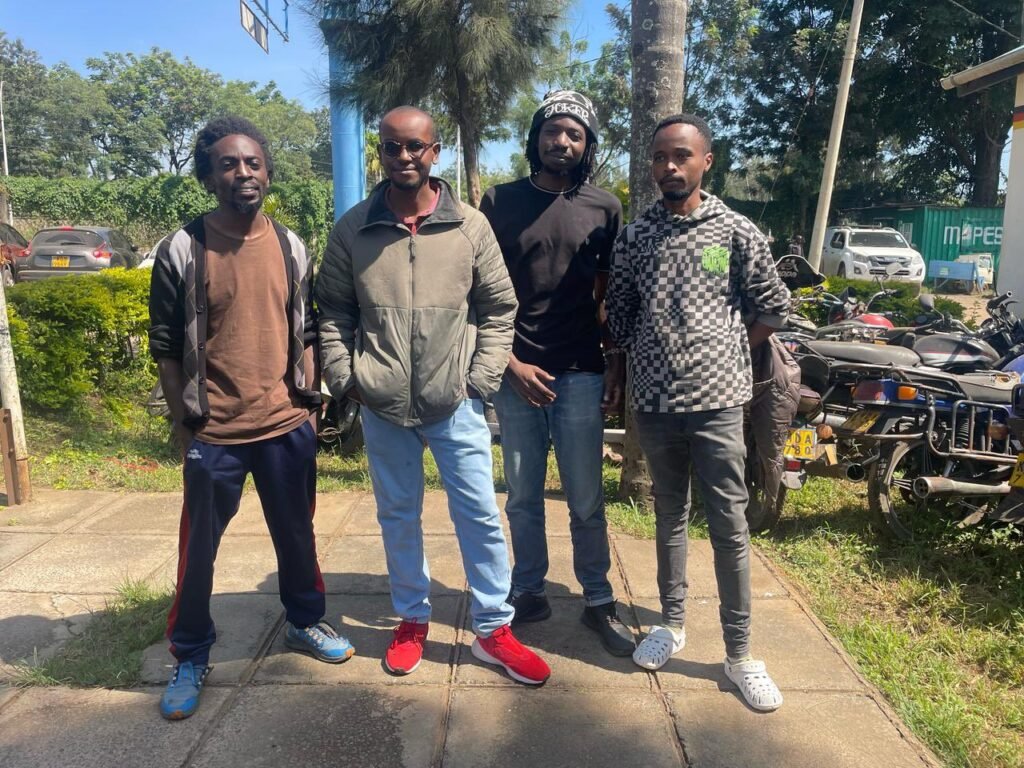NAIROBI, KENYA — The British Broadcasting Corporation (BBC) has issued a statement clarifying that the four Kenyan filmmakers recently apprehended are not affiliated with the production of its controversial “Blood Parliament” documentary.
According to a press release from the BBC Press Office, the individuals taken into custody played no role in the creation of the BBC Africa Eye investigation. The statement explicitly affirmed, “We have been made aware of the arrest of four journalists in Kenya. To confirm, they were not involved in any way in the making of BBC Africa Eye’s Blood Parliament documentary.”
Initial media reports had widely suggested that the filmmakers; Nicholas Wambugu, Brian Adagala, Mark Denver Karubiu, and Christopher Wamae, who were arrested on Friday night at their studios in Karen, had contributed to the contentious “Blood Parliament” documentary produced by the BBC.
However, subsequent developments indicate that the four have since been released on a free bond.
Their legal representative, Ian Mutiso, confirmed their release but noted that “their devices have however not been returned to them.”
He further elaborated, “Yesterday I was able to follow up on this arrest at Pangani Police Station. I personally called the regional commander and other officers who gave me details on their arrest.” Mr. Mutiso also expressed gratitude towards the Defenders Coalition and Vocal Africa, stating, “I want to appreciate the Defenders Coalition and Vocal Africa, which are the two organisations that were ready to assist and ensure that the cashbail had been posted incase it was needed.”
The Kenya Film and Television Professionals Association (KFPTA) filmmakers says they had been booked on Friday night under allegations of “false publication.”
“We have been informed that they are facing charges related to publishing false information and cyberbullying, and we call on the relevant authorities to provide full transparency regarding these charges and the conditions under which the filmmakers are being held,” KFPTA Chairperson Ezekiel ‘Ezy’ Onyango says in a statement seen by Vivid Voice News.
Human rights activist and lawyer Hussein Khalid of Vocal Africa corroborated the location of their detention, stating that “the filmmakers were being held in Pangani and Muthaiga Police Stations.” He further commented on the government’s reaction, asserting, “It seems this government has panicked and is making school kid mistakes. They are inviting people back to the streets.”
The police have refrained from issuing any official statement regarding the arrests. The release of the “Blood Parliament” documentary the previous week was met with controversy, including the obstruction of a planned community screening that subsequently triggered public outcry.

The BBC report meticulously analyzed over 5,000 images to reconstruct the sequence of events on June 25, 2024, identifying police officers allegedly responsible for the deaths of three protestors.
The documentary has drawn strong condemnation from Members of Parliament. Dagoreti MP John Kiarie questioned the BBC’s motives, stating, “BBC is funded by taxpayers’ money in Britain, meaning that it is funded to push the foreign agenda internationally. We want to know if the BBC is speaking as a mouthpiece of the government and the people of Britain or what it is doing.”
MP Kiarie further speculated on the documentary’s underlying agenda, suggesting, “Could it be an attempt to arm-twist this country so that they can rescind the rider that we put on the training of BATUK units in Kenya and perpetuate a history of extractive economy, oppressive and exploitative economy in an unfair trade balance between Kenya and the UK?”
Conversely, Suba North MP Millie Odhiambo advocated for a comprehensive investigation and cautioned against any attempts by the government to stifle press freedom. “I think we have not handled the issue well, and that is why people are coming from outside to document the events of that day. We do not need the BBC to tell us that something is wrong. We have a very angry young generation and we cannot bury our heads in the sand,” she asserted.
Ms. Odhiambo also emphasized the need to address the underlying grievances, adding, “We think we are moving on but there are many young people who have not necessarily moved on. I appeal that we set up a select committee to deal with the the after effect of the Finance Bill 2024.”
A BBC spokesperson had previously confirmed the disruption of a screening, stating, “A screening of BBC Africa Eye’s ‘Blood Parliament in Kenya’ was cancelled due to pressure from the authorities.”
The “Blood Parliament” documentary has also intensified calls for the apprehension of the police officers implicated in the alleged brutality during the protests.

